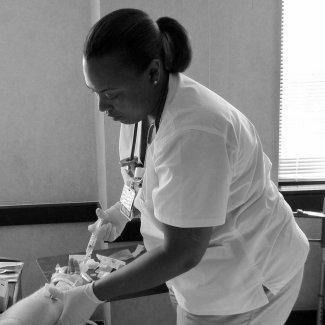
Registered nurses are typically responsible for maintaining patient records, administering medications and treatments to patients, establishing treatment plans, observing patients and recording the findings, consulting with doctors, performing diagnostic tests, and educating patients and their families about conditions.
(For more info on how to become a registered nurse, go to our article here)
Salary
How much do RNs make? According to the Bureau of Labor Statistics records for May 2012, the average registered nurse salary in the United States is $67,930, which is equivalent to a mean hourly wage of $32.66. The bottom ten percent of registered nurses earns $45,040, while the top ten percent in the profession earn nearly six-figures at an average $94,720 each year. Generally, registered nurses with higher levels of experience and licensing or training are compensated at the higher salaries.
Registered nurses that are employed in general medical hospitals make an average mean salary of $69,490, while those in physician offices earn significantly less than average at $62,120. The highest paying industries for this occupation remain the federal executive branch at $79,270, and colleges or universities at a mean annual salary of $74,540. Throughout the nation, the registered nurses with the highest annual salaries can be found in California at an astounding average $94,120 salary.
| State | Hourly Wage | Average Salary | Number of Jobs |
|---|---|---|---|
| Alabama | $26.57 | $55,270 | 43,760 |
| Alaska | $38.93 | $80,970 | 5,350 |
| Arizona | $34.32 | $71,390 | 45,600 |
| Arkansas | $26.62 | $55,360 | 23,480 |
| California | $45.25 | $94,120 | 249,980 |
| Colorado | $32.66 | $67,920 | 41,380 |
| Connecticut | $36.37 | $75,660 | 34,820 |
| Delaware | $34.05 | $70,820 | 9,660 |
| Florida | $29.70 | $61,780 | 163,720 |
| Georgia | $29.22 | $60,770 | 64,180 |
| Hawaii | $40.74 | $84,750 | 10,060 |
| Idaho | $28.42 | $59,100 | 11,420 |
| Illinois | $31.66 | $66,260 | 114,730 |
| Indiana | $27.65 | $57,520 | 58,430 |
| Iowa | $25.26 | $52,540 | 32,170 |
| Kansas | $26.94 | $56,040 | 26,380 |
| Kentucky | $27.65 | $57,510 | 42,920 |
| Louisiana | $29.45 | $61,260 | 40,180 |
| Maine | $29.18 | $60,700 | 14,260 |
| Maryland | $34.18 | $71,090 | 45,630 |
| Massachusetts | $40.08 | $83,370 | 79,570 |
| Michigan | $30.97 | $64,430 | 90,540 |
| Minnesota | $34.03 | $70,780 | 54,940 |
| Mississippi | $27.76 | $57,740 | 28,200 |
| Missouri | $27.40 | $56,990 | 65,260 |
| Montana | $28.81 | $59,920 | 8,400 |
| Nebraska | $27.09 | $56,350 | 18,590 |
| Nevada | $37.44 | $77,870 | 16,790 |
| New Hampshire | $30.73 | $63,920 | 12,530 |
| New Jersey | $36.45 | $75,820 | 74,700 |
| New Mexico | $32.07 | $66,710 | 14,780 |
| New York | $35.63 | $74,100 | 166,950 |
| North Carolina | $28.25 | $58,760 | 86,240 |
| North Dakota | $25.73 | $53,520 | 7,580 |
| Ohio | $29.31 | $60,970 | 120,460 |
| Oklahoma | $26.91 | $55,980 | 26,850 |
| Oregon | $37.75 | $78,530 | 28,840 |
| Pennsylvania | $31.25 | $65,000 | 125,220 |
| Rhode Island | $35.13 | $73,070 | 11,840 |
| South Carolina | $28.33 | $58,940 | 41,870 |
| South Dakota | $25.39 | $52,800 | 11,030 |
| Tennessee | $26.83 | $55,800 | 55,580 |
| Texas | $31.90 | $66,350 | 187,290 |
| Utah | $28.76 | $59,810 | 17,920 |
| Vermont | $30.46 | $63,350 | 6,310 |
| Virginia | $30.31 | $63,050 | 58,650 |
| Washington | $36.22 | $75,350 | 51,060 |
| West Virginia | $56.20 | $54,490 | 17,440 |
| Wisconsin | $30.77 | $64,000 | 54,640 |
| Wyoming | $29.18 | $60,690 | 4,460 |
| Data courtesy of U.S. Bureau of Labor Statistics | |||
Work Environment
As the largest occupation in the booming health care industry, there are more than 2.6 million jobs for registered nurses in many work settings. An estimated 48 percent of registered nurses are employed in general medical and surgical hospitals, making it the highest concentrated industry for the profession. The remainder works in physician offices, home health care services, nursing homes, residential care facilities, schools, government agencies, educational services, and correctional facilities.
Since patients within hospitals and other facilities require care around the clock, nurses in these work environments may work irregular and long hours. Registered nurses may be expected to work night, weekend, and holiday shifts, while being on call at other times. Nurses that are employed in industries that do not provide 24-hour care are more likely to work full-time during regular business hours. Around 20 percent of registered nurses are employed part-time. Employment for registered nurses is expected to grow faster than average at 26 percent between 2010 and 2020.

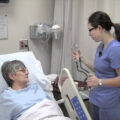
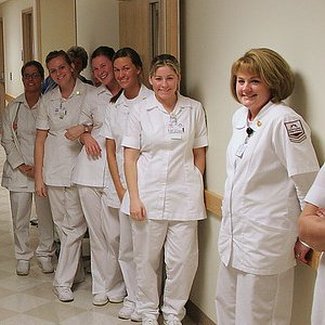
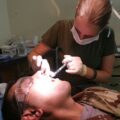




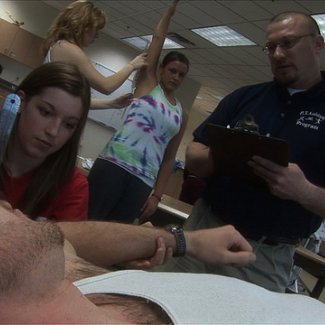



you give lot of information about nursing Thank you now I can focus on my careear!
Happy to help!
is we really going to make that much will you can count me in I really want to help my family but please don’t disappoint me I really want to get that money thank you for helping me with all of that
Hello I’m doing research on RNs and if you would have time and so kind to answer my question I would be very great full . Who was the author of this article ? Thank you for your time.
Hey, Yvonne. Sorry for the delay. My name is Andrew. I am the webmaster and writer of this article.
Great weblog here! Additionally your web site a lot up fast! What web host are you the use of? Can I get your affiliate link for your host? I wish my site loaded up as fast as yours lol